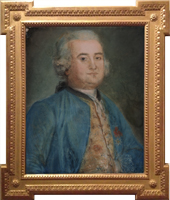In 1977 descendants of Francisco Bouligny established the Bouligny Foundation to promote the study of Bouligny’s life and the history of Spanish Louisiana. The foundation’s activities included publishing a newsletter, sponsoring the Bouligny Prize for research papers on Francisco Bouligny and the Spanish colonial period, and hosting an annual lecture series. After many years of operation, the Bouligny Foundation dissolved and established an annual lecture at The Historic New Orleans Collection that would draw attention to the Spanish heritage of Louisiana.
Because the endowment for the annual lecture series does not cover all the costs associated with this event, your financial support is greatly appreciated. Should you like more information about helping to continue this important lecture series, please call The Collection’s development office at (504) 598-7109. All inquiries are held in strictest confidence and without obligation. Thank you for your support.
Francisco Bouligny
 Francisco Domingo Joseph Bouligny, the son of Juan Bouligny and María Paret, was born in Alicante, Spain, in 1736. He entered military service at the age of 22 and served in Havana from 1763 to 1769, when he joined Alejandro O’Reilly’s Louisiana expedition. Charged with investigating and reporting the reaction of New Orleans residents against Spanish rule, Bouligny served as the translator at the trial of individuals who had participated in the initial uprising against Gov. Antonio de Ulloa’s government.
Francisco Domingo Joseph Bouligny, the son of Juan Bouligny and María Paret, was born in Alicante, Spain, in 1736. He entered military service at the age of 22 and served in Havana from 1763 to 1769, when he joined Alejandro O’Reilly’s Louisiana expedition. Charged with investigating and reporting the reaction of New Orleans residents against Spanish rule, Bouligny served as the translator at the trial of individuals who had participated in the initial uprising against Gov. Antonio de Ulloa’s government.
On December 27, 1770, Bouligny married Marie Louise Le Sénéchal d’Auberville of Louisiana. In 1776, he submitted to the Spanish government a description of the natural resources, population, and exposed positions of Louisiana, along with his recommendations for the colony. Subsequently, Bouligny was appointed lieutenant governor of Louisiana in charge of new settlements, commerce, and Native American relations. In April 1779, he established New Iberia with immigrants from Málaga, Spain.
From 1779 to 1781, Bouligny participated in the numerous military campaigns of Gov. Bernardo de Gálvez. In 1791, he was appointed full colonel in charge of the Louisiana Infantry Regiment. Upon the death of Gov. Manuel Gayoso in 1799, Bouligny became acting governor for military affairs.
Francisco Bouligny died on November 25, 1800, in New Orleans. His career spanned nearly all of the Spanish Louisiana colonial period.
